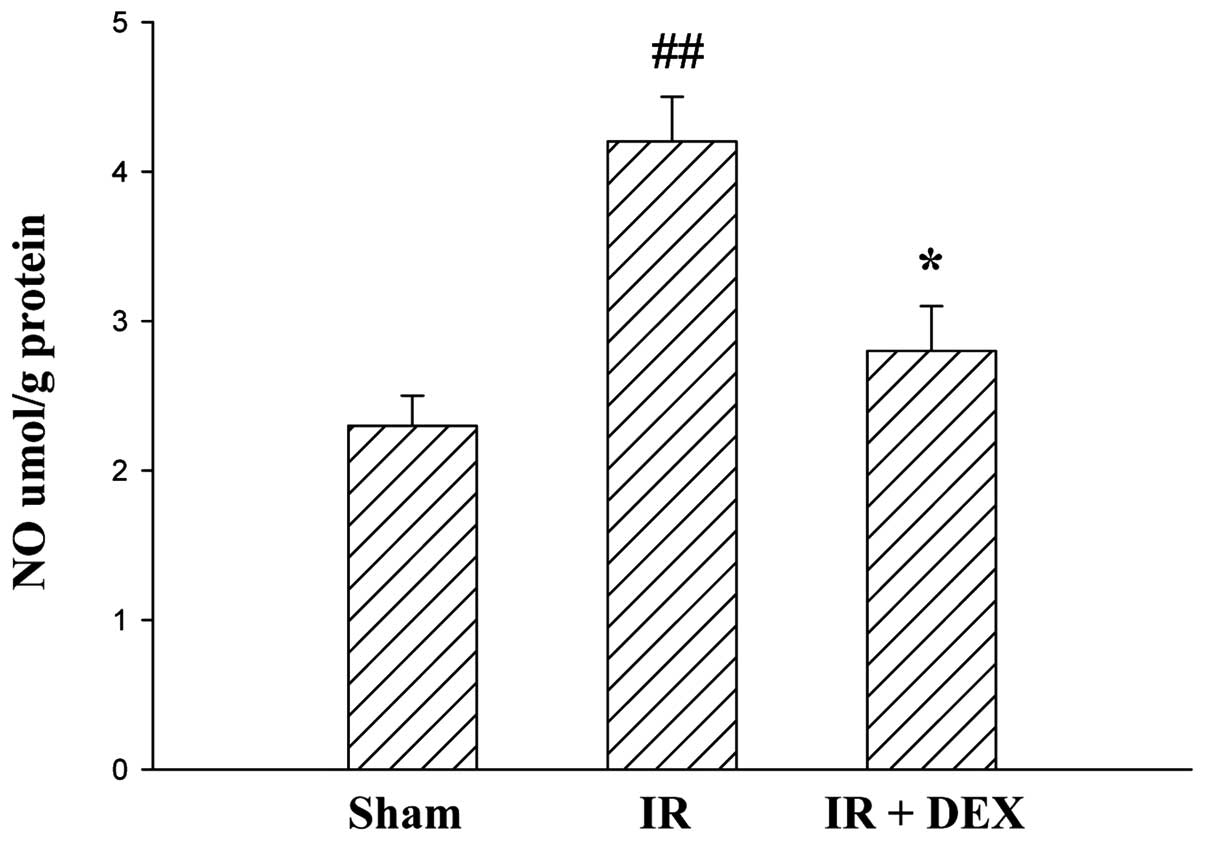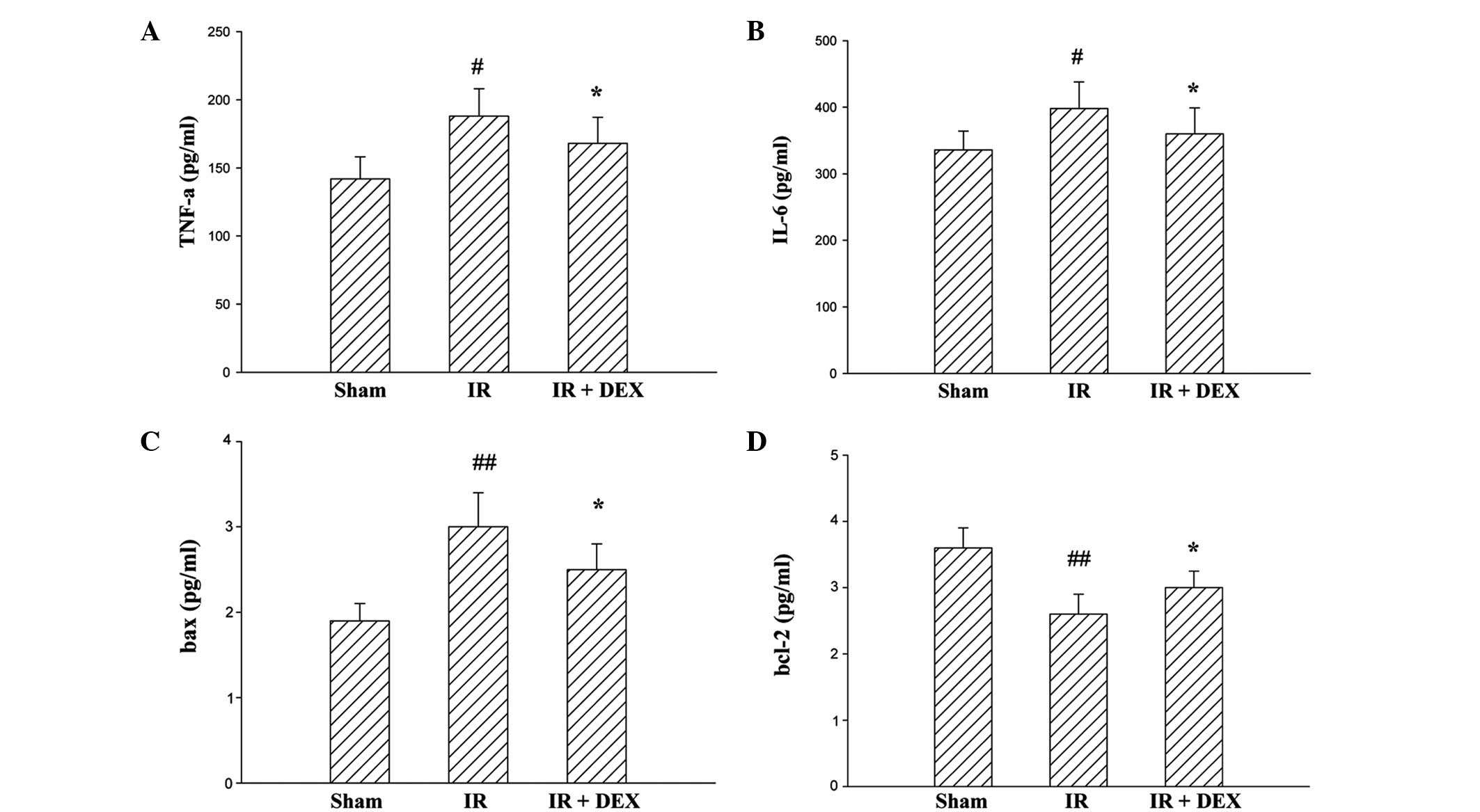|
1
|
Shen J and Fu G, Jiang L, Xu J, Li L and
Fu G: Effect of dexmedetomidine pretreatment on lung injury
following intestinal ischemia-reperfusion. Exp Ther Med.
6:1359–1364. 2013.PubMed/NCBI
|
|
2
|
Xia G, Martin AE, Michalsky MP and Besner
GE: Heparin-binding EGF-like growth factor preserves crypt cell
proliferation and decreases bacterial translocation after
intestinal ischemia/reperfusion injury. J Pediatr Surg.
37:1081–1087. 2002. View Article : Google Scholar : PubMed/NCBI
|
|
3
|
El Assal ON and Besner GE: Heparin-binding
epidermal growth factor-like growth factor and intestinal
ischemia-reperfusion injury. Semin Pediatr Surg. 13:2–10. 2004.
View Article : Google Scholar : PubMed/NCBI
|
|
4
|
Fujise T, Iwakiri R, Wu B, Amemori S,
Kakimoto T, Yokoyama F, Sakata Y, Tsunada S and Fujimoto K:
Apoptotic pathway in the rat small intestinal mucosa is different
between fasting and ischemia-reperfusion. Am J Physiol Gastrointest
Liver Physiol. 291:G110–G116. 2006. View Article : Google Scholar : PubMed/NCBI
|
|
5
|
Taha MO, Miranda-Ferreira R, Fagundes AL,
Fagundes DJ, Simões RS, Santos JM, Souza PD, Oliveira-Júnior IS,
Marchini A, Gomes IT, et al: Effects of L-nitro-arginine methyl
ester, an inhibitor of nitric oxide biosynthesis, on intestinal
ischemia/reperfusion injury in rabbits. Transplant Proc.
42:457–460. 2010. View Article : Google Scholar : PubMed/NCBI
|
|
6
|
Yang S, Chou WP and Pei L: Effects of
propofol on renal ischemia/reperfusion injury in rats. Exp Ther
Med. 6:1177–1183. 2013.PubMed/NCBI
|
|
7
|
Petrat F and de Groot H: Protection
against severe intestinal ischemia/reperfusion injury in rats by
intravenous resveratrol. J Surg Res. 167:e145–e155. 2011.
View Article : Google Scholar : PubMed/NCBI
|
|
8
|
Hanci V, Erol B, Bektaş S, Mungan G,
Yurtlu S, Tokgöz H, Can M and Ozkoçak Turan I: Effect of
dexmedetomidine on testicular torsion/detorsion damage in rats.
Urol Int. 84:105–111. 2010. View Article : Google Scholar : PubMed/NCBI
|
|
9
|
Lai YC, Tsai PS and Huang CJ: Effects of
dexmedetomidine on regulating endotoxin-induced up-regulation of
inflammatory molecules in murine macrophages. J Surg Res.
154:212–219. 2009. View Article : Google Scholar : PubMed/NCBI
|
|
10
|
Lin S, Dai N, Cheng Z, Shao W and Fu Z:
Effect of dexmedetomidine-etomidate-fentanyl combined anesthesia on
somatosensory- and motor-evoked potentials in patients undergoing
spinal surgery. Exp Ther Med. 7:1383–1387. 2014.PubMed/NCBI
|
|
11
|
Kiliç K, Hanci V, Selek S, Sözmen M, Kiliç
N, Citil M, Yurtlu DA and Yurtlu BS: The effects of dexmedetomidine
on mesenteric arterial occlusion-associated gut ischemia and
reperfusion-induced gut and kidney injury in rabbits. J Surg Res.
178:223–232. 2012. View Article : Google Scholar : PubMed/NCBI
|
|
12
|
Ozacmak VH, Sayan H, Arslan SO, Altaner S
and Aktas RG: Protective effect of melatonin on contractile
activity and oxidative injury induced by ischemia and reperfusion
of rat ileum. Life Sci. 76:1575–1588. 2005. View Article : Google Scholar : PubMed/NCBI
|
|
13
|
Gao Y, Deng XG, Sun QN and Zhong ZQ:
Ganoderma spore lipid inhibits N-methyl-N-nitrosourea-induced
retinal photoreceptor apoptosis in vivo. Exp Eye Res. 90:397–404.
2010. View Article : Google Scholar : PubMed/NCBI
|
|
14
|
Hassoun HT, Weisbrodt NW, Mercer DW, Kozar
RA, Moody FG and Moore FA: Inducible nitric oxide synthase mediates
gut ischemia/reperfusion-induced ileus only after severe insults. J
Surg Res. 97:150–154. 2001. View Article : Google Scholar : PubMed/NCBI
|
|
15
|
Potoka DA, Nadler EP, Upperman JS and Ford
HR: Role of nitric oxide and peroxynitrite in gut barrier failure.
World J Surg. 26:806–811. 2002. View Article : Google Scholar : PubMed/NCBI
|
|
16
|
Upperman JS, Potoka D, Grishin A, Hackam
D, Zamora R and Ford HR: Mechanisms of nitric oxide-mediated
intestinal barrier failure in necrotizing enterocolitis. Semin
Pediatr Surg. 14:159–166. 2005. View Article : Google Scholar : PubMed/NCBI
|
|
17
|
Szadujkis-Szadurska K, Grzesk G,
Szadujkis-Szadurski L, Gajdus M and Matusiak G: Role of nitric
oxide and cGMP in the modulation of vascular contraction induced by
angiotensin II and Bay K8644 during ischemia/reperfusion. Exp Ther
Med. 5:616–620. 2013.PubMed/NCBI
|
|
18
|
Lin CY, Tsai PS, Hung YC and Huang CJ:
L-type calcium channels are involved in mediating the
anti-inflammatory effects of magnesium sulphate. Br J Anaesth.
104:44–51. 2010. View Article : Google Scholar : PubMed/NCBI
|
|
19
|
Eser O, Fidan H, Sahin O, Cosar M, Yaman
M, Mollaoglu H, Songur A and Buyukbas S: The influence of
dexmedetomidine on ischemic rat hippocampus. Brain Res.
1218:250–256. 2008. View Article : Google Scholar : PubMed/NCBI
|
|
20
|
Taniguchi T, Kurita A, Kobayashi K,
Yamamoto K and Inaba H: Dose- and time-related effects of
dexmedetomidine on mortality and inflammatory responses to
endotoxin-induced shock in rats. J Anesth. 22:221–228. 2008.
View Article : Google Scholar : PubMed/NCBI
|
|
21
|
Can M, Gul S, Bektas S, Hanci V and
Acikgoz S: Effects of dexmedetomidine or methylprednisolone on
inflammatory responses in spinal cord injury. Acta Anaesthesiol
Scand. 53:1068–1072. 2009. View Article : Google Scholar : PubMed/NCBI
|
|
22
|
Memiş D, Hekimoğlu S, Vatan I, Yandim T,
Yüksel M and Süt N: Effects of midazolam and dexmedetomidine on
inflammatory responses and gastric intramucosal pH to sepsis, in
critically ill patients. Br J Anaesth. 98:550–552. 2007. View Article : Google Scholar : PubMed/NCBI
|
|
23
|
Venn RM, Bryant A, Hall GM and Grounds RM:
Effects of dexmedetomidine on adrenocortical function, and
cardiovascular, endocrine and inflammatory responses in
post-operative patients needing sedation in the intensive care
unit. Br J Anaesth. 86:650–656. 2001. View Article : Google Scholar : PubMed/NCBI
|
|
24
|
Yang Y, Liu JL, Qin C, Li JP, Wang XL,
Zhang ZX and Zhang L: Effects of cerebellar fastigial nucleus
electrical stimulation on telomerase reverse transcriptase
expression and mitochondrial apoptotic pathway in rats with focal
cerebral ischemia and reperfusion. Zhonghua Yi Xue Za Zhi.
91:1643–1648. 2011.(In Chinese). PubMed/NCBI
|
|
25
|
Lau BW, Wong AO, Tsao GS, So KF and Yip
HK: Molecular cloning and characterization of the zebra fish (Danio
rerio) telomerase catalytic subunit (telomerase reverse
transcriptase, TERT). J Mol Neurosci. 34:63–75. 2008. View Article : Google Scholar : PubMed/NCBI
|


















